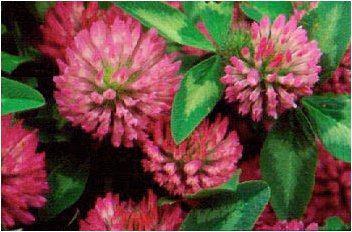- Red clover is a plant. The flower tops are used to make medicine.
Contents
Uses
- Cancer prevention
- Indigestion
- High cholesterol
- Whooping cough
- Cough
- Asthma
- Bronchitis
- Sexually transmitted diseases (STDs).
- Some women use red clover for symptoms of menopause such as hot flashes; for breast pain or tenderness (mastalgia); and for premenstrual syndrome (PMS).
- Red clover is applied to the skin for skin cancer, skin sores, burns, and chronic skin diseases including eczema and psoriasis.
- In foods and beverages, the solid extract of red clover is used as a flavoring ingredient.
- Red clover contains hormone-like chemicals called isoflavones that seem to cause reproductive problems in certain animals. Experts think a diet high in isoflavones may have been responsible for reports of reproductive failure and liver disease in cheetahs living in zoos. In large quantities, red clover can cause sterility in livestock.
Benefits
- Red clover contains “isoflavones” which are changed in the body to “phytoestrogens” that are similar to the hormone estrogen.
Cautions
- Red clover is LIKELY SAFE for most people when used in the amounts found in food. It is POSSIBLY SAFE when used in medicinal amounts by mouth or applied to the skin.
- Red clover can cause rash-like reactions, muscle ache, headache, nausea, and vaginal bleeding (spotting) in some women.
- Pregnancy and breast-feeding: Red clover is LIKELY SAFE when taken by mouth in amounts commonly found in food. However, it is LIKELY UNSAFE when taken by mouth in medicinal amounts. Red clover acts like estrogen and might disturb important hormone balances during pregnancy or breast-feeding. Don’t use it.
- Not enough is known about the safety of red clover when applied to the skin during pregnancy or breast-feeding. Stay on the safe side and don’t use it.
- Bleeding disorders: Red clover might increase the chance of bleeding. Avoid large amounts and use with caution.
- Hormone-sensitive conditions such as breast cancer, uterine cancer, ovarian cancer, endometriosis, or uterine fibroids: Red clover might act like estrogen. If you have any condition that might be made worse by exposure to estrogen, don’t use red clover.
- Protein S deficiency: People with protein S deficiency have an increased risk of forming blood clots. There is some concern that red clover might increase the risk of clot formation in these people because it has some of the effects of estrogen. Don’t use red clover if you have protein S deficiency.
- Surgery: Red clover might slow blood clotting. It might increase the chance of extra bleeding during and after surgery. Stop taking red clover at least 2 weeks before a scheduled surgery.
- There isn’t enough information to rate the safety of red clover when applied to the skin.
Interactions
Red Clover has many interactions to be cautious of. For information on these interactions please-
See Red Clover Interactions
Other Names
Beebread, Clovone, Cow Clover, Daidzein, Genistein, Isoflavone, Meadow Clover, Miel des Prés, Phytoestrogen, Purple Clover, Trebol Rojo, Trèfle Commun, Trèfle des Prés, Trèfle Pourpre, Trèfle Rouge, Trèfle Rougeâtre, Trèfle Violet, Trefoil, Trifolium, Trifolium pratense, Wild Clover.
References
Source: WebMD, “Red Clover”, www.webmd.com/vitamins-supplements/

